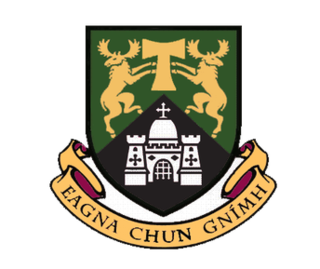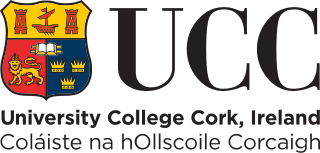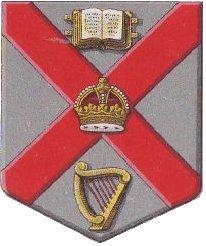
The University of Limerick (UL) is a public research university institution in Limerick, Ireland. Founded in 1972 as the National Institute for Higher Education, Limerick, it became a university in September 1989 in accordance with the University of Limerick Act 1989. It was the first university established since Irish independence in 1922, followed by the establishment of Dublin City University.
James Clement Dooge was an Irish Fine Gael politician, engineer, climatologist, hydrologist and academic who served as Minister for Foreign Affairs from 1981 to 1982, Leader of the Seanad and Leader of Fine Gael in the Seanad from 1982 to 1987 and Cathaoirleach of Seanad Éireann from 1973 to 1977. He served as a Senator from 1961 to 1977 and 1981 to 1987.

A National Institute for Higher Education (NIHE) was a category of higher education institution established in Ireland to provide higher level technical education above the standard of the then established Regional Technical College system, at university level. Higher level technical education in Ireland was seen to be an area that was poorly served until the advent of these institutions.

The Higher Education and Training Awards Council (HETAC), the legal successor to the National Council for Educational Awards (NCEA), granted higher education awards in Ireland beyond the university system from 2001 to 2012. HETAC was created in 2001, subject to the policies of the National Qualifications Authority of Ireland, and, specifically, granted qualifications at many Institutes of Technology and other colleges. HETAC was dissolved and its functions were passed to Quality and Qualifications Ireland (QQI) on 6 November 2012.

University College Cork – National University of Ireland, Cork (UCC) is a constituent university of the National University of Ireland, and located in Cork.

Third-level education in the Republic of Ireland includes all education after second-level, encompassing higher education in universities and colleges and further education on Post Leaving Certificate (PLC) and other courses.

Alfred O'Rahilly, KSG was an academic with controversial views on both electromagnetism and religion. He briefly served in politics, as a Teachta Dála (TD) for Cork City, and was later the president of University College Cork. He also became a priest following the death of his wife.

The Queen's University of Ireland was established formally by royal charter on 3 September 1850, as the degree-awarding university of the Queen's Colleges of Belfast, Cork, and Galway that were established in 1845 "to afford a university education to members of all religious denominations" in Ireland.
Colm Ó hEocha was an Irish scientist and educationalist, who served as president of University College Galway and Chairman of the New Ireland Forum.
The Fitzgibbon Cup is the trophy for the premier hurling championship among higher education institutions in Ireland.
Enda McDonagh was an Irish priest of the Catholic Church. He was ordained a priest in 1955 and served in the Archdiocese of Tuam. He was noted for being the official chaplain to Mary Robinson while she was President of Ireland.
John J. Kelly is a senior Irish academic. A professor of chemical engineering, he was for a period dean of the Faculty of Engineering at University College Dublin. He was executive director of the Ireland Canada University Foundation, chairman of the Scholarship Board of the O'Reilly Foundation, and president of Independent College Dublin, and is chairman of the board of trustees of the Friends of Bethlehem University in Ireland.
Dermod Dwyer is Executive Chairman of the Convention Centre Dublin, the Ritz- Carlton Powerscourt and Setanta Sports Broadcasting Ireland.

The Ashbourne Cup is an Irish camogie tournament played each year to determine the national champion university or third level college. The Ashbourne Cup is the highest division in inter-collegiate camogie. The competition features many of the current stars of the game and is sometimes known as the 'Olympics of Camogie' because of the disproportionate number of All Star and All-Ireland elite level players who participate each year Since 1972 it has been administered by the Higher EducationArchived 31 May 2011 at the Wayback Machine committee of the Camogie Association. TU Dublin are the current champions, having won the Ashbourne cup in 2023.
Neville Keery is a writer and activist and has had a career as a journalist, administrative officer, Senator, and Senior European Commission Official.

Laurence Joseph Kettle D.Sc. was a key figure in the industrial and scientific advancement of early twentieth-century Ireland, serving as Chief Engineer of the Dublin Corporation, before being elected as President of The Institution of Civil Engineers and becoming the first chairman of the Industrial Research Committee. He was a founding member of the World Power Conference, a fellow of the Institute of Fuel and a founding member of the Irish Volunteers alongside his brother, the poet and politician, Thomas Kettle.
Daniel O'Hare, often Danny O'Hare,, is an Irish academic and former university leader, best known as the founding leader and first president of Dublin City University, one of two new universities established in Ireland in September 1989. He has also held a wide range of public governance positions, and is an elected Member of the Royal Irish Academy in the Science division. Coming from Dundalk, he is a chemist, specialized in advanced spectroscopy.
Peter Vincent Delaney MB, BSc, MCh, FRCSI was an Irish colorectal surgeon. He founded the Sylvester O'Halloran Perioperative Symposium and Meeting, a fixture of the Irish surgical calendar, and received the President's Medal from the University of Limerick.
Michael Grimes (1888–1977) was a scientist and researcher from Ireland. He is known for his work in microbiology.

Cork Savings Bank is a nineteenth century neoclassical building on Lapp's Quay in Cork city, Ireland. A purpose-built bank, it was completed in 1842 and is currently in use by University College Cork as their so-called "Centre for Executive Education".










